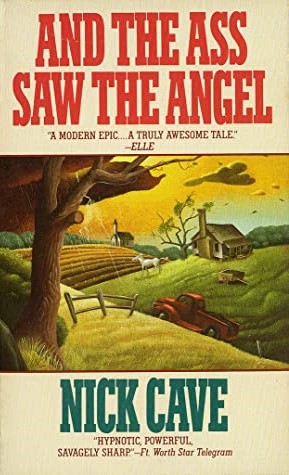 By NICK CAVE (Harper; 1989/92)
By NICK CAVE (Harper; 1989/92)
In the category of fiction written by famous singers AND THE ASS SAW THE ANGEL, the first novel by Australia’s Nick Cave, ranks with classics of the form like Leonard Cohen’s BEAUTIFUL LOSERS and Michael Gira’s THE CONSUMER. Ponderous and self-indulgent yet undeniably brilliant, Cave’s novel is an oft-exasperating reading experience, but a satisfying one.
AND THE ASS SAW THE ANGEL, inspired by a never completed screenplay entitled SWAMPLAND, takes place in the American South in the early-to-mid Twentieth Century, a setting that recalls the Biblically-inspired lyrics to many a Nick Cave and the Black Seeds tune (although the desolate wonderland described in these pages, as in those tunes, more closely resembles the outback of Cave’s native Australia). It’s here, in an absurdly backward town, that Euchrid Eucrow is born.
Euchrid is actually one of two twins, but his brother doesn’t last very long (“’Jesus! Two!’ cried Pa, but one died soon”), leaving Euchrid to navigate an increasingly twisted universe on his own. The difficulty of this task is compounded by the fact that he’s mute, and that his parents, who include an alcohol-addled mother and an abusive father who spends his days creating deadly hunting traps, are both insane.
“’Jesus! Two!’ cried Pa, but one died soon…”
Euchrid becomes “Jesus struck dumb” (Cave’s own words), spending his days spying on the actions of the townspeople. After his father brutally kills his mother with one of her own booze bottles (in a deliriously gory passage that could have sprung directly from a Lucio Fulci movie) Euchrid grows increasingly hermetic. His only friend is Mule, a.k.a. the family mule, who’s beaten to death by Pa. The latter isn’t too long for this world, either, dying in an accident not long after the murder of his wife.
Euchrid becomes obsessed with Beth, a beatific young girl venerated by the town religiosos, and she has a definite kinship with he, being raised in complete isolation and having a worldview nearly as odd as that of Euchrid. Upon catching a glimpse of him one day she mistakes him for God.
… a suitably expansive, multi-character canvas and a decades-spanning narrative superstructure.
Speaking of whom: Euchrid, whose delusional first person recountings increasingly overtake the book, comes to believe he’s in direct contact with Big Guy, and doing his bidding. This leads to the construction of a garbage fortress housing a “kingdom” of caged animals, the killings of some local hoboes (throwing into question Euchrid’s Jesus-like status) and a final confrontation with the townspeople, who rise up in mass to destroy Euchrid and his kingdom.
This all makes for a most unlikely epic of conquest and revenge, yet as such AND THE ASS SAW THE ANGEL works. It has a suitably expansive, multi-character canvas and a decades-spanning narrative superstructure.
…William-Faulkner-meets-John-Waters aesthetic…
Where the book runs into trouble is in its use of language. Cave himself has described the novel as being “written in a kind of hyper-poetic thought-speak not meant to be spoken, a mongrel language that was part Biblical, part Deep South dialect, part gutter slang, at times obscenely reverent and at others reverently obscene.” Included are lists, lengthy Biblical quotations (which oftentimes diverge mightily from church-sanctioned wording) and Euchrid’s own nutty first person recollections, in which he refers to himself as “ah” (in place of “I”) and fantasy and reality become inextricably intermeshed.
Another issue I have is with the tone, which veers between poetic realism and a neo-gothic unreality that’s often downright cartoony. The mixture is an uneasy one, although it does make for an interesting William-Faulkner-meets-John-Waters aesthetic you won’t find in too many other books.
